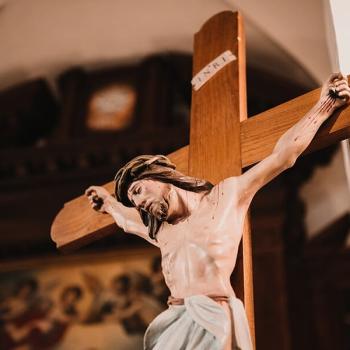
By Grace Vargas
(This year, the Forum for Theological Exploration will spotlight 12 leaders, their stories, and how their passion and call to shape a more hopeful future through Christian ministry guides the impact they are making in their communities, institutions and universities. You can find the full series, here.)
The deepest connections happen when we can locate ourselves in a story. We say things like, “that’s me,” “I’ve been there,” or “I know what that’s like.” We feel seen, heard, and understood.
I believe in the power of stories. I think Jesus did, too. Much of his ministerial life was spent teaching through stories. They have the power to be transformative and to connect us to each other and to the Divine at a deep level. The story of Christianity is the most powerful story in my life. Yet I have not always been able to locate myself in it.
I grew up with a hyphenated identity as a second-generation immigrant in this country. It has never been an easy experience for me to try to understand myself and to be understood by others and if I am honest, it continues to be a challenge. One of the places where I most acutely felt left-out was the church. It is especially ironic when you consider that I attended an immigrant church where all my peers were second-generation immigrants just like me. My sense of exclusion did not come from my peers, rather from the theological education I both received and imparted.
I spent my adolescent and young adult years teaching Sunday school to youth just like me. Despite my minimal life experience at the time, I still noticed that the curriculum materials available to me from prominent Christian publishing houses were disconnected from the lived reality of our immigrant church and its members. Cultural references, social experiences, and even the idiomatic expressions used to communicate Gospel truths, all attempted to tell me what my story should be. My experiences were not represented and at times, it became difficult to connect with this Christian story that seemed to be the story of others, not my own.
It turns out there’s a reason for that, and I was about to see it firsthand in of all places, seminary.
Fast forward to 2011 when I felt the call to attend seminary. While in coursework, eager to learn about how to serve my community, I was stunned to discover that we Latinos were practically nowhere to be found in the history of the Christian Church. It became clear to me just how much of Christian history and tradition treats non-European contributions to the religious movement as an afterthought. If non-European churches are addressed at all, they are relegated to being the church of the colonized in early modern history or the missionized in modern history. Such a limited Christian story obscures the myriad ways in which other ecclesial movements have contributed to, and even been key players in, the Christian story.
With little to connect to, I’ve seen some diaspora faith communities lose sight of the unique ways in which God has historically spoken to them through their distinct cultures; they will even suppress their cultural expression of the faith for the sake of blending into the dominant story. Historically speaking, we are simply not telling the whole truth and are promoting a false privileging of only one strand of the movement, which robs everyone of a complete account. Theologically speaking, I think the entire body of Christ loses an opportunity to gain new insights into the ongoing work of God in the world.
I now find myself in my second-year of doctoral work in Religious Studies. As I prepare to become a historian of the global Christian movement with a concentration in Latin American Christianity, I revere the wisdom of the late Rubem Alves: “The historian is someone who recovers forgotten memories and disseminates them as a sacrament to those who have lost the memory…To recover in order to disseminate. The historian is not an archaeologist of memories. He [sic] is a sower of visions and of hopes.”[1] The stories I endeavor to recover and pass on testify to the significant ways in which the Latin American church and its progeny, the Latino church in the U.S., have historically contributed to the dynamic story of the Christian movement.
My vocational journey toward teaching and ministry in the church and the academy began with a deep conviction: it is no longer acceptable to tell only one side of the story. The impact I hope my scholarship makes is two-fold. I want people in the Latino church, particularly the Protestant church, to know their ecclesial history is more than as colonial subjects and passive recipients of missionary efforts. I also want those beyond the church and Christianity to know that the more complete story of the movement of the Christian religion includes stories that have been historically marginalized and/or forgotten. Both these objectives involve a commitment to the idea that stories are powerful, and that when we know where we’ve come from, we are better oriented on our current path and future journey.
*******
Grace Vargas is a second-year Ph.D. student at Southern Methodist University in Dallas, TX. Her doctoral research involves a postcolonial and critical analysis of U.S. Protestant missions in Cuba at the turn of the 20th century. She is a member of the 2016 Doctoral Cohort of the Forum for Theological Education (FTE); the recipient of the 2016-2017 Doctoral Fellowship of The Louisville Institute, a Lilly Endowment-funded program, 2012 FTE Ministry Fellowship, Princeton Theological Seminary’s 2014 Senior Fellowship in History, SMU’s University Fellowship and the SMU Dedman Dean’s Fellowship. She is also a second-year doctoral scholar of the Hispanic Theological Initiative.
[1] Quoted in Bonino, José Míguez, Faces of Latin American Protestantism: 1993 Carnahan Lectures, (Gran Rapids, MI: Wm.B. Eerdmans, 1995), 107.













